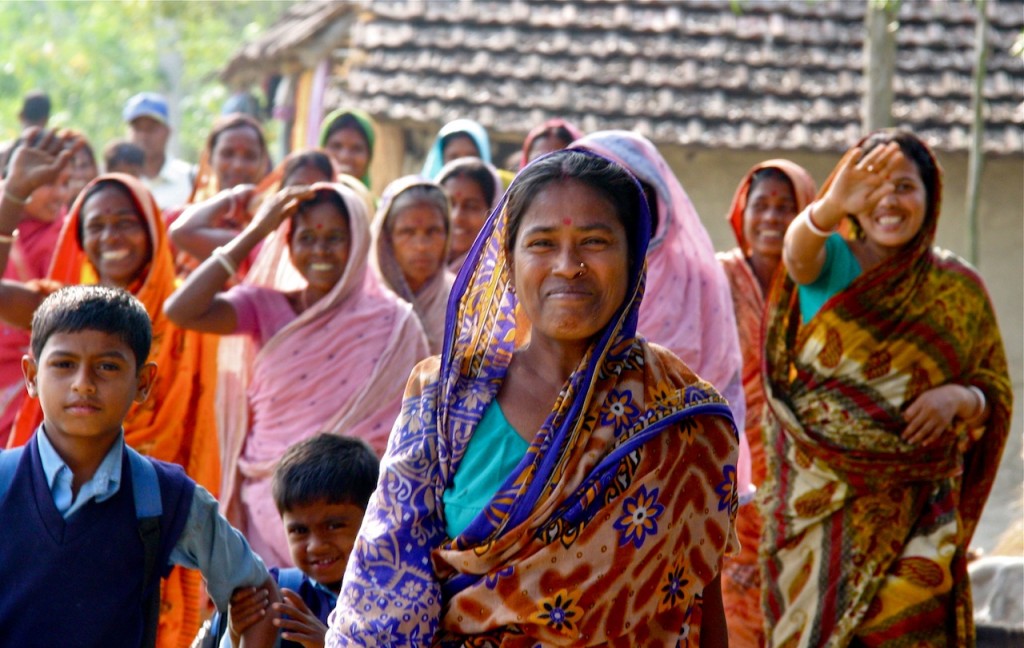 Rucha Chitnis is the South Asia Program Director of Women’s Earth Alliance, a nonprofit that mobilizes resources to grassroots, women-led groups working at the intersection of women’s rights, food sovereignty, and environmental justice. She serves as an advisor to Global Greengrants Fund and recommends grants to support groups in Jharkhand, West Bengal, and beyond. Rucha recently wrote about “How women in India are adapting to climate change”. Rucha Chitnis is the South Asia Program Director of Women’s Earth Alliance, a nonprofit that mobilizes resources to grassroots, women-led groups working at the intersection of women’s rights, food sovereignty, and environmental justice. She serves as an advisor to Global Greengrants Fund and recommends grants to support groups in Jharkhand, West Bengal, and beyond. Rucha recently wrote about “How women in India are adapting to climate change”. |
I recently had the immense privilege of traveling for six weeks through central and eastern India to engage in a dialogue with grassroots women’s groups. These women are raising their voices on deeply complex and gravely serious human rights issues. For example, they are advocating for indigenous peoples in Chhattisgarh, who risk being displaced by a dam. They are also promoting the leadership of rural women in Assam in governance, and educating pregnant women and new mothers who work in an open-pit coal mine in Jharkhand about infant and maternal health.
My first stop was in the Sundarbans in West Bengal. Meaning “a beautiful forest,” the Sundarbans is a UNESCO World Heritage Site and the world’s largest mangrove ecosystem. Home to the majestic Bengal tiger and various other wildlife, these mangroves are a biodiversity haven that is also vulnerable to natural disasters. For women farmers here, adapting to a changing climate has been a debilitating and burdensome reality.

At a gathering of women farmers in the Sundarbans, women shared how they are dealing with the impact of Cyclone Aila, which struck in 2009. Aila was deadly: it left more than a million people homeless and displaced hundreds of thousands. The women recalled those dark days, when the saline floodwaters surged into their farmlands, destroying their crops and homes, and contaminating their drinking water.
“When Aila hit, the roof of my home was destroyed,” shared Bhagwati, a farmer in the village of Gayadham. “We had no shelter, and we received no information or help from the government—not even tarpaulin shelters over our heads.”
Bhagwati is part of the women’s group Maa Durga, named after a Hindu goddess known for her fierce strength and divine powers. Most women in this group are landless farmers who work as agricultural laborers.
Women from Maa Durga share that one of their primary concerns is access to safe drinking water. Hunger and malnourishment is also high in the Sundarbans, and a health survey revealed that many women in the group are anemic. During my visit, I learned that high reliance on chemicals and pesticides for agriculture has also depleted the stock of edible weeds, fish, frogs, and crabs from the paddy fields. These once abundant food sources used to supplement the diet of low-income families.

Over the past year, Global Greengrants Fund has supported Maa Durga through a grant to the Development Research Communication and Services Centre. This organization is helping 150 women farmers, including members of Maa Durga, to strengthen their food security and livelihoods, and raise awareness about climate change.
Maa Durga women are also learning sustainable agriculture practices to reduce their dependency on expensive and harmful chemicals and pesticides, and they are planting kitchen gardens with diverse varieties of nutritious food crops.
Geeta Das, one group member, showed us how she makes natural pesticides and fertilizers using cow dung, neem leaves, vermicompost, and other natural materials. Geeta is now growing more than 13 varieties of vegetables, greens, and tubers in her small home garden.

Women from the Maa Durga group shared that last year they organized a rally in their community to raise awareness about climate change and to promote sustainable agriculture. They were also part of a camp to raise awareness about the harmful effect of chemical fertilizers and pesticides. Local women’s groups also plan to advocate for their rights and government entitlements by taking action in the gram sabha—a meeting of voting adults, who are part of the local self-governing unit called the panchayat.
Maa Durga is proving that when women find their power and raise their voices, they can guide their communities on a path of dignity, justice, and sustainability.
Read Rucha’s other posts on gender discrimination in agriculture and how women in India are adapting to climate change.
